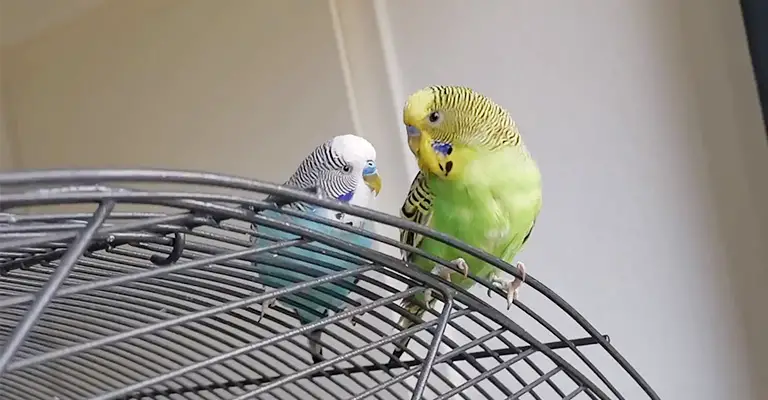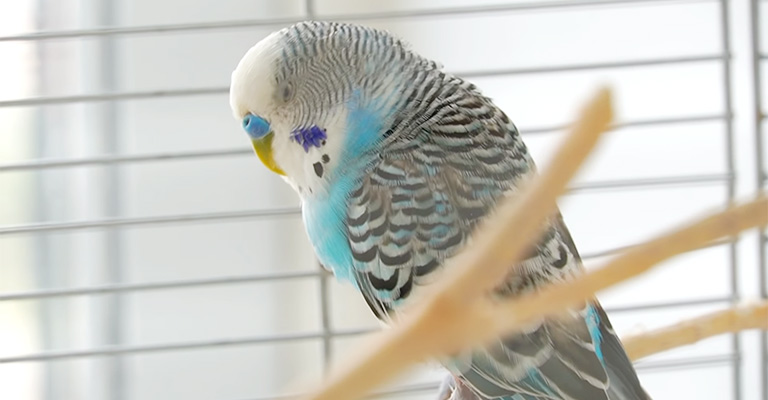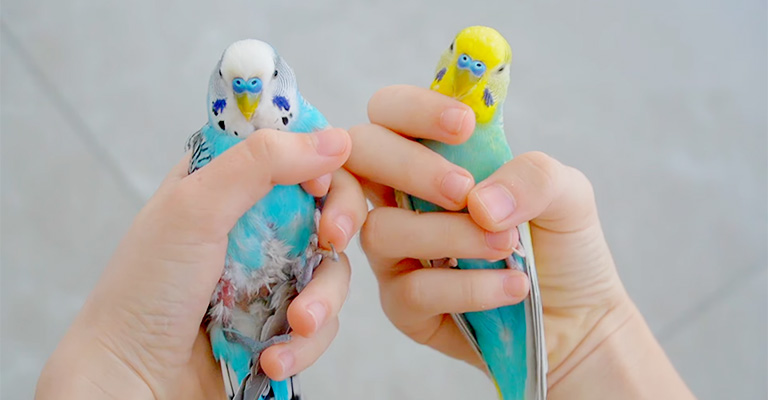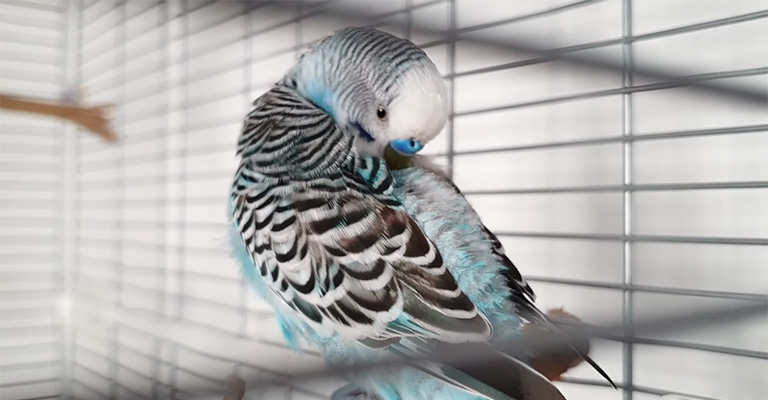Budgies, also known as parakeets, are popular and captivating pet birds known for their vibrant colors, playful nature, and distinctive chirping.
As responsible budgie owners, it is essential to observe and understand their behavior, ensuring their overall well-being. One peculiar behavior that may cause concern is when a budgie’s wings are slightly open and shaking.
This article will explore the possible reasons behind this behavior and discuss appropriate treatment methods.

Reasons For Budgie Wings Slightly Open And Shaking
There are several possible reasons why your budgie may open its wings slightly and shake them. Some of these are normal and harmless, while others may indicate a problem that needs attention. Here are some of the most common reasons:
Preening
Preening is the process of grooming and cleaning the feathers. Budgies preen themselves regularly to keep their feathers healthy and neat.
Sometimes, after preening, a budgie may open its wings slightly and shake them out to realign the feathers. This is normal behavior that helps the budgie maintain its plumage.
Showing Off
Budgies are social and expressive birds that use their wings for communication and display. Sometimes, a budgie may open its wings slightly and shake them to show off its feathers, especially during mating season.
This is a way of attracting a partner or asserting dominance over other birds. This is also a normal behavior that reflects the budgie’s mood and personality.
Cooling Down

Budgies are native to Australia and need a warm environment to thrive. However, they can also overheat if the temperature is too high or they are exposed to direct sunlight.
Budgies can sometimes open their wings slightly to cool themselves down by allowing air to circulate through their bodies. This is a natural behavior that helps the budgie regulate its body temperature.
Stress Or Fear
Budgies are prey animals that can be startled or scared by loud noises, sudden movements, predators, or unfamiliar situations. When a budgie feels threatened or stressed, it may release adrenaline into its system, which prepares it for flight or fight.
Adrenaline can cause the budgie to shake or tremble due to increased heart rate, blood pressure, and breathing. A budgie may open its wings slightly and flap them to appear larger and more intimidating to potential enemies. This defensive behavior helps the budgie cope with stress or fear.
Illness Or Injury
Budgies are prone to various diseases and injuries affecting their health and well-being. Some of these conditions can cause the budgie to shake or shiver as a symptom or a side effect.
For example, a budgie may shake if it has a fever, an infection, a parasite, a tumor, a neurological disorder, or a metabolic disorder.
A budgie may also shake if it is in pain due to an injury, such as a broken bone, a wound, or a sprain. A budgie may open its wings slightly to relieve pressure or discomfort from its body. This is an abnormal behavior that indicates the budgie is sick or hurt.
Differentiating Normal And Abnormal Behavior

While slight wing shaking and slightly open branches can be considered normal behavior in budgies, it’s important to distinguish between normal and abnormal behavior to ensure your pet’s well-being. Here are some key points to consider:
Duration and Frequency
Typical wing shaking is usually brief and intermittent, lasting for a few seconds to a minute. Abnormal behavior involves long-branch shivering that persists for an extended period.
Accompanying Signs
Other normal behaviors, such as chirping, playing, or eating, often accompany regular wing shaking. Abnormal behavior may be accompanied by signs of distress, such as lethargy, loss of appetite, excessive vocalization, or ruffled feathers.
Consistency
The expected behavior is consistent with the bird’s overall temperament and routine. Abnormal behavior, on the other hand, deviates significantly from the budgie’s usual patterns.
Treatment For Budgie Wings Slightly Open And Shaking

If your budgie’s wings are slightly open and shaking, it may indicate an underlying health issue or discomfort. It is essential to consult with an avian veterinarian for an accurate diagnosis and appropriate treatment plan.
Here are some general treatment approaches that may be employed, explained in points:
Veterinary Consultation
Seek the expertise of an avian veterinarian who can examine your budgie and determine the underlying cause of the open and shaking wings.
They will perform a thorough physical examination and may recommend additional tests, such as blood work or imaging, to aid in diagnosis.
Addressing Medical Conditions
The treatment for open and shaking wings depends on the underlying cause identified by the veterinarian.
It may involve addressing medical conditions such as muscle weakness, injury, pain, or neurological issues. The veterinarian may prescribe medications, physical therapy, or other necessary interventions.
Nutritional Assessment
Improper nutrition can contribute to muscle weakness and other health issues. The veterinarian may evaluate your budgie’s diet and recommend adjustments to ensure it receives a balanced and nutritious diet.
This may include incorporating a variety of fresh vegetables, fruits, high-quality pellets, and appropriate protein sources.
Environmental Considerations
Evaluate the budgie’s environment for potential stressors or factors contributing to discomfort. Ensure the cage is appropriate size and structure, with appropriate perches and environmental enrichment. Provide a calm and quiet space for the bird to reduce stress levels.
Temperature and Humidity
Maintain an optimal temperature and humidity level in the budgie’s environment. Extreme temperatures or high humidity can negatively affect their health and contribute to discomfort. Consult with the veterinarian to determine the ideal temperature and humidity range for your budgie’s well-being.
Supportive Care
Provide supportive care to your budgie during the treatment period. This may include ensuring access to fresh water, a clean living environment, and regular exercise opportunities within their capabilities. Observe the budgie’s behavior closely and provide comfort and reassurance as needed.
Follow-up Care
Follow the veterinarian’s instructions for follow-up appointments and treatment progress evaluations. The veterinarian will assess the budgie’s response to the treatment and make any necessary adjustments. Regular check-ups are essential to monitor the budgie’s condition and ensure proper healing and recovery.
FAQ
Budgies may open and shake their wings to stretch, exercise, or regulate body temperature. It’s usually a natural behavior unless accompanied by other signs of distress.
Not necessarily. Budgies may shake their wings due to excitement, happiness, or even after preening. However, if other abnormal symptoms are present, such as lethargy or loss of appetite, it could indicate an underlying health issue.
Normal wing shaking is usually brief and intermittent, followed by the bird resuming normal activities. Abnormal behavior may involve prolonged wing shaking, lethargy, ruffled feathers, decreased vocalization, or a change in appetite.
If your budgie’s wings remain open and shaking continuously for an extended period, it could be a sign of distress or discomfort. It’s advisable to monitor your budgie closely and consult with an avian veterinarian if the behavior persists.
If you suspect your budgie is distressed, ensure it has a comfortable and stress-free environment. Offer fresh food and water, maintain appropriate temperature and humidity levels, and provide exercise and mental stimulation opportunities. If the behavior persists or worsens, seek professional advice from an avian veterinarian.
Conclusion
Budgies are wonderful pets that can display various behaviors using their wings. Sometimes, they may open their attachments slightly and shake them for different reasons.
Some of these reasons are normal and harmless, while others may indicate a problem that needs attention.
As a responsible owner, you should understand the meaning behind your budgie’s wing shaking and react accordingly. By doing so, you can ensure your budgie’s health and happiness.